The Austrian School is a heterodox school of economic thought that is based on methodological individualism, the concept that social phenomena result exclusively from the motivations and actions of individuals.

Murray Newton Rothbard was an American heterodox economist of the Austrian School, economic historian and political theorist. Rothbard was a founder and leading theoretician of anarcho-capitalism, a staunch advocate of historical revisionism and a central figure in the 20th-century American libertarian movement. He wrote over twenty books on political theory, revisionist history, economics, and other subjects.

Henry Stuart Hazlitt was an American journalist who wrote about business and economics for such publications as The Wall Street Journal, The Nation, The American Mercury, Newsweek, and The New York Times.
The Ludwig von Mises Institute for Austrian Economics, or Mises Institute, is a libertarian nonprofit think tank located in Auburn, Alabama, United States. It is named after Austrian School economist Ludwig von Mises (1881–1973).
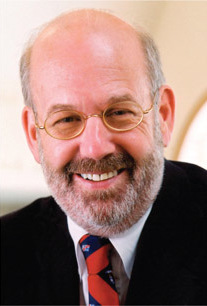
Llewellyn Harrison Rockwell Jr. is an American author, editor, and political consultant. A libertarian and a self-professed anarcho-capitalist, he founded and is the chairman of the Mises Institute, a non-profit dedicated to promoting the Austrian School of economics.
Paleolibertarianism was a strategy of political activism for libertarianism developed by American anarcho-capitalist theorists Murray Rothbard and Lew Rockwell in the American political context after the end of Cold War, from 1989 to 1995, that sought to deliver the libertarian ideas of opposition to government intervention using messages accessible to working and middle-class people of the time —an approach usually identified as right-wing populism— to radicalize them against the state. The name elected for this kind of activism was in remembrance of the roots of the modern libertarian movement: the American classical liberal movement of the first half of the 20th century that was part of the anti-war and anti–New Deal Old Right.
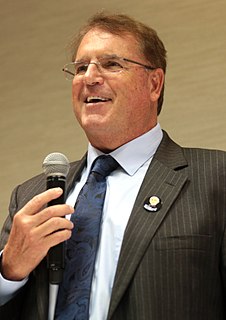
Thomas James DiLorenzo is an American economics professor at Loyola University Maryland Sellinger School of Business. He identifies as an adherent of the Austrian School of economics. He is a research fellow at The Independent Institute, a senior fellow of the Ludwig von Mises Institute, Board of Advisors member at CFACT, and an associate of the Abbeville Institute. He holds a Ph.D. in Economics from Virginia Tech.

Mark Thornton is an American economist of the Austrian School. He has written on the topic of prohibition of drugs, the economics of the American Civil War, and the "Skyscraper Index". He is a Senior Fellow with the Ludwig von Mises Institute in Alabama and a Research Fellow with the Independent Institute.

Jeffrey Albert Tucker is an American economics writer of the Austrian School, an advocate of anarcho-capitalism and Bitcoin, a publisher of libertarian books, a conference speaker, and an internet entrepreneur.
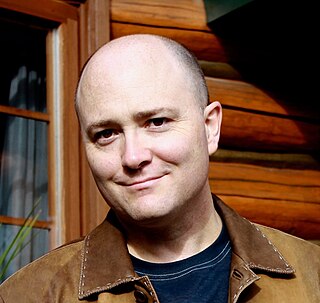
Norman Stephan Kinsella is an American intellectual property lawyer, author, and deontological anarcho-capitalist. His legal works have been published by Oxford University Press, Oceana Publications, Mises Institute, Quid Pro Books and others.
Libertarianism in the United States is a political philosophy promoting individual liberty. According to common meanings of conservatism and liberalism in the United States, libertarianism has been described as conservative on economic issues and liberal on personal freedom, often associated with a foreign policy of non-interventionism. Broadly, there are four principal traditions within libertarianism, namely the libertarianism that developed in the mid-20th century out of the revival tradition of classical liberalism in the United States after liberalism associated with the New Deal; the libertarianism developed in the 1950s by anarcho-capitalist author Murray Rothbard, who based it on the anti-New Deal Old Right and 19th-century libertarianism and American individualist anarchists such as Benjamin Tucker and Lysander Spooner while rejecting the labor theory of value in favor of Austrian School economics and the subjective theory of value; the libertarianism developed in the 1970s by Robert Nozick and founded in American and European classical liberal traditions; and the libertarianism associated to the Libertarian Party which was founded in 1971, including politicians such as David Nolan and Ron Paul.
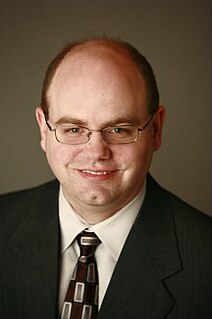
Robert Patrick Murphy is an American economist. Murphy is Research Assistant Professor with the Free Market Institute at Texas Tech University. He has been affiliated with Laffer Associates, the Pacific Research Institute, the Institute for Energy Research (IER), the Independent Institute, the Ludwig von Mises Institute, and the Fraser Institute.

Gerard Casey is an Irish academic who is Professor Emeritus at University College Dublin.
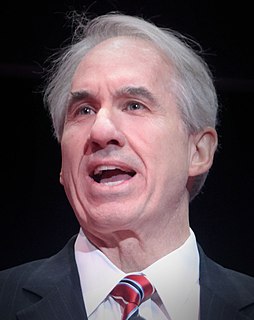
David Scott Limbaugh is a conservative American political commentator and author who has also worked as a professor and as a lawyer. He is the younger brother of talk radio host Rush Limbaugh.
Right-libertarianism, also known as libertarian capitalism or right-wing libertarianism, is a political philosophy and type of libertarianism that supports capitalist property rights and defends market distribution of natural resources and private property. The term right-libertarianism is used to distinguish this class of views on the nature of property and capital from left-libertarianism, a type of libertarianism that combines self-ownership with an egalitarian approach to natural resources. In contrast to socialist libertarianism, right-libertarianism supports free-market capitalism. Like most forms of libertarianism, it supports civil liberties, especially natural law, negative rights and a major reversal of the modern welfare state.

Conceived in Liberty, authored by Murray Rothbard, is a 5-volume narrative concerning the history of the United States from the pre-colonial period through the American Revolution.

The Politically Incorrect Guide to American History is a work of paleoconservative literature covering various issues in U.S. history by Thomas E. Woods, published in December 2004. This book was the first in the Politically Incorrect Guide series published by Regnery Publishing, who view the series as covering topics without consideration for political correctness. The book was present on The New York Times best-seller list for many weeks.
Christian libertarianism is the synthesis of Christian beliefs concerning free will, human nature and God-given inalienable rights with libertarian political philosophy.
Libertarian conservatism, also referred to as conservative libertarianism and conservatarianism, is a political philosophy that combines conservatism and libertarianism, representing the libertarian wing of conservatism and vice versa.
Christopher A. Ferrara is an American Roman Catholic lawyer, pro-life activist, and writer. He is the founder and president of the American Catholic Lawyers Association. He is also a regular columnist of The Remnant, a traditionalist Catholic newspaper.














